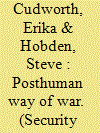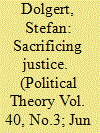| Srl | Item |
| 1 |
ID:
142496


|
|
|
|
|
| Summary/Abstract |
Recent interventions from a ‘posthumanist’ or ‘new materialist’ perspective have highlighted the embedded character of human systems within a ‘panarchy’ of human and non-human systems. This article brings attention to a very particular element of materiality, one with a profound significance for issues of security – relations between human and non-human animals in instances of conflict. It is an indication of the deeply human-centred character of both international relations and security studies that almost none of the central texts mention the very significant roles that non-human animals have in the conduct of war. We argue that the character of war would have been radically different but for the forced participation by an enormous range of non-human animals. Even though, with the improvements in transportation over the last century, non-human animals are less evident in the context of the movement of people and equipment, they still play a significant number of roles in the contemporary war-machines of wealthy countries. Drawing on literature from critical animal studies, sociology and memoirs, this article discusses the enormous variety of roles that non-human animals have played in the conduct of war, and examines the character of human–non-human animal relations in times of war.
|
|
|
|
|
|
|
|
|
|
|
|
|
|
|
|
| 2 |
ID:
113827


|
|
|
|
|
| Publication |
2012.
|
| Summary/Abstract |
Democratic theorists have increasingly turned to Aeschylus' Oresteia as a resource for challenging the shortcomings of liberal theory, but I argue that this particular return to Greek tragedy should be treated with a healthy dose of skepticism. Defenders of Aeschylean justice have underplayed the sacrificial aspects of his solution to the problem of civil strife, mistaking the consent of the Furies for a resolution that escapes the cycle of violence. Drawing on elements of Greek ritual practice, I contend that Aeschylus folds the consent of the Furies into a sacrificial framework which denies the violence it enacts by directing this violence toward nonhumans. As a consequence Aeschylean justice is complicit in continuing the sacrificial economy it seems to subvert, and Aeschylean politics relies on the suffering of nonhumans (and humans) to secure its conception of order.
|
|
|
|
|
|
|
|
|
|
|
|
|
|
|
|